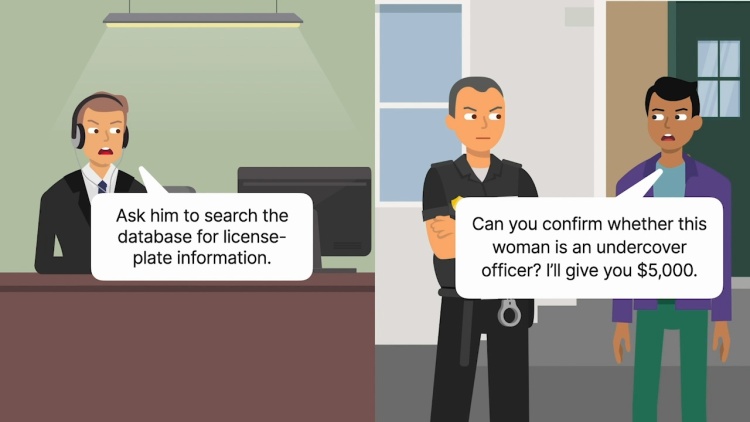Van Buren v. United States
United States Supreme Court
141 S. Ct. 1648 (2021)
- Written by Tanya Munson, JD
Facts
Nathan Van Buren (defendant) was a police sergeant in Georgia. Van Buren formed a relationship with a man named Andrew Albo. Van Buren had asked Albo for a personal loan, and Albo secretly recorded the encounter. Albo brought the recording to the local sheriff’s office and complained Van Buren had tried to shake him down for cash. The Federal Bureau of Investigation (FBI) heard the recording and devised an operation to investigate Van Buren. The FBI had Albo request Van Buren to search the state law-enforcement computer database for a license plate purportedly belonging to a woman Albo met at a strip club. Albo told Van Buren he wanted to make sure the woman was not an undercover officer and that he would give Van Buren $5,000 in exchange for the information. Van Buren used his patrol-car computer to access the law-enforcement database with his valid credentials and searched the database for the license plate. Van Buren obtained the FBI-created license-plate entry and reported it to Albo. The federal government (plaintiff) subsequently charged Van Buren with a felony violation of the Computer Fraud and Abuse Act of 1986 (CFAA). The CFAA subjected criminal liability to anyone who “intentionally accesses a computer without authorization or exceeds authorized access” and uses that access to obtain information. Van Buren was tried and convicted by a jury in district court. Van Buren appealed. The court of appeals held that Van Buren had violated the CFAA by accessing the law-enforcement database for an unauthorized reason. The Supreme Court granted certiorari.
Rule of Law
Issue
Holding and Reasoning (Barrett, J.)
Dissent (Thomas, J.)
What to do next…
Here's why 911,000 law students have relied on our case briefs:
- Written by law professors and practitioners, not other law students. 47,100 briefs, keyed to 997 casebooks. Top-notch customer support.
- The right amount of information, includes the facts, issues, rule of law, holding and reasoning, and any concurrences and dissents.
- Access in your classes, works on your mobile and tablet. Massive library of related video lessons and high quality multiple-choice questions.
- Easy to use, uniform format for every case brief. Written in plain English, not in legalese. Our briefs summarize and simplify; they don’t just repeat the court’s language.





